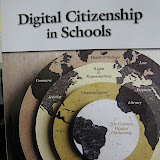 My presentation at the NETWORKSHOP 2009 conference in Szeged was a chance to discuss the topic of Digital Citizenship in an international context. The Hungarian title of the presentation translates as Digital Citizenship in
My presentation at the NETWORKSHOP 2009 conference in Szeged was a chance to discuss the topic of Digital Citizenship in an international context. The Hungarian title of the presentation translates as Digital Citizenship in Higher Education: Intercultural Dimensions. That was my grand plan when I wrote the original abstract; however, at this point my presentation was more basic, simply explaining the framework of digital citizenship, and exploring whether this concept is an appropriate teaching solution in schools across cultures.
Higher Education: Intercultural Dimensions. That was my grand plan when I wrote the original abstract; however, at this point my presentation was more basic, simply explaining the framework of digital citizenship, and exploring whether this concept is an appropriate teaching solution in schools across cultures.This topic is based on the work of Mike Ribble and Gerald Bailey, elaborated upon in the 2007 book Digital Citizenship in Schools, published by ISTE (International Society for Technology in Education. My VSU ITED 8100 students use this book as a supplementary textbook, and have just finished their big Online Learning Activity projects, all on the topic of Digital Citizenship. In these projects teams of students created and presented professional development activities for educational professionals on some aspect of digital citizenship.

 I explained my interest in the topic to the audience--I teach experienced teachers whose responsibilities include teaching digital technology knowledge, skills, and behaviors to students. I explained that I had asked questions about these issues of my international students, and international faculty friends, and found many similarities in concerns, but some differences. I proposed some questions about whether the digital citizenship framework was relevant across cultures, and asked the academic audience to consider how students learn appropriate digital behaviors.
I explained my interest in the topic to the audience--I teach experienced teachers whose responsibilities include teaching digital technology knowledge, skills, and behaviors to students. I explained that I had asked questions about these issues of my international students, and international faculty friends, and found many similarities in concerns, but some differences. I proposed some questions about whether the digital citizenship framework was relevant across cultures, and asked the academic audience to consider how students learn appropriate digital behaviors.I also explained in more detail three of the digital citizenship
 themes, and how the model of knowledge, skills, and attitudes could intersect with teaching, modeling, and enforcing responsibilities of teachers, parents, peers, self, and technology. I closed with a list of observations I had made about digital citizenship in the Hungarian context, and in my own practice while on faculty exchange in Hungary. A colleague from EKF and I will begin to analyze the results of some qualitative data collected from his students in coming weeks.
themes, and how the model of knowledge, skills, and attitudes could intersect with teaching, modeling, and enforcing responsibilities of teachers, parents, peers, self, and technology. I closed with a list of observations I had made about digital citizenship in the Hungarian context, and in my own practice while on faculty exchange in Hungary. A colleague from EKF and I will begin to analyze the results of some qualitative data collected from his students in coming weeks.The full PowerPoint of the conference presentation can be seen by clicking on the link below. A narrated slidecast will soon be available on Slideshare.net.
 |
| Digital Citizenship |

No comments:
Post a Comment